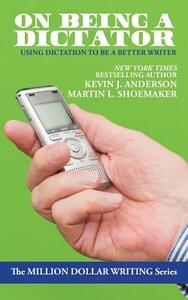You need to sign in or sign up before continuing.
Take a photo of a barcode or cover
7 reviews for:
On Being a Dictator: Using Dictation to Be a Better Writer
Martin L. Shoemaker, Kevin J. Anderson
7 reviews for:
On Being a Dictator: Using Dictation to Be a Better Writer
Martin L. Shoemaker, Kevin J. Anderson
I purchased this book because I couldn't find much info on the internet about the actual process of dictation aside from KJA and obscure youtube videos.
This was drafted in a week and it shows. It's vague and lacking in content. I'm confident that if one had a fifteen minute conversation with each of these authors about this precise topic, you could deduce and expound from those conversations at least twice as much actionable material as is found here.
They both have a phenomenal grasp of the process, as shown by the number of books they've written and sold, but this book reads as a cliffnotes version of a cash grab. I'm a bit disappointed, but would be lying if I said I'd expected something more.
Pros: Written by industry professionals with the credentials to back them up.
Cons: No lessons, advice, or things to practice aside from "Just Practice". Absolutely no grasp or reference to the beefy amount of resources available for those not using a literal handheld recorder. Which makes sense- they're writing the book, after all.
Overall, I can't say I'd recommend this to others unless they specifically asked after this precise topic. Will keep it on my shelf as reference for practice.
This was drafted in a week and it shows. It's vague and lacking in content. I'm confident that if one had a fifteen minute conversation with each of these authors about this precise topic, you could deduce and expound from those conversations at least twice as much actionable material as is found here.
They both have a phenomenal grasp of the process, as shown by the number of books they've written and sold, but this book reads as a cliffnotes version of a cash grab. I'm a bit disappointed, but would be lying if I said I'd expected something more.
Pros: Written by industry professionals with the credentials to back them up.
Cons: No lessons, advice, or things to practice aside from "Just Practice". Absolutely no grasp or reference to the beefy amount of resources available for those not using a literal handheld recorder. Which makes sense- they're writing the book, after all.
Overall, I can't say I'd recommend this to others unless they specifically asked after this precise topic. Will keep it on my shelf as reference for practice.
informative
inspiring
fast-paced
This book is inspiring for anyone who wants to make the most out of their time and get ideas on paper. The authors show readers that you don’t necessarily have to sit in front of a computer to write incredible prose. What you will discover our best practices, equipment, and software that works for the authors, and new ideas about approaching the writing world.
If you're curious about dictating story, or pretty much anything, this book will get you over the hump. there's an intimidation factor on how to make dictation work and after reading this it was dispelled (for me). Worth every penny.
funny
informative
lighthearted
fast-paced
This slim volume is basically Kevin J. Anderson and Martin L. Shoemaker telling you why they use voice dictation for their writing, and the specifics of how they do it. Their techniques differ--Shoemaker dictates while driving a one hour commute to and from work (and emphasizes the safe way to do so), while Anderson usually takes a digital voice recorder with him when he is out on hikes, keeping fit while staying productive. They sometimes overlap methods and Anderson in particular makes use of typing services, which can transcribe at a typical cost of one cent per word or thereabouts. He admits this is not suitable for all writers. A 100,000 word novel would cost $1,000 to transcribe, a hefty sum for a lot of people, especially those new to writing.
Each author also uses dictation for brainstorming, tossing out ideas, character background and more into their recordings. Shoemaker uses Dragon Professional 15.0 to transcribe his recordings and is satisfied with its accuracy, noting that cleanup is always part of the editing process, regardless of writing method.
They cover all the basics--when and where to dictate, overcoming the embarrassment of talking to yourself in public, getting comfortable with the sound of your own voice, and more.
All of this is good stuff, and both writers present their use cases in convincing fashion. The book does lack a certain amount of depth--this is Anderson and Shoemaker relating their experiences, with a minimum of advice, technical or otherwise. Those looking for more specifics on using voice dictation for writing may be better served by checking out The Writer's Guide to Training Your Dragon by Scott Baker (which still covers the latest version of Dragon as of this writing, August 2019) or Chris Fox's 5,000 Words Per hour.
Still, this is very much a worthy read, if for no other reason than to provide a little more incentive to making the jump to using voice dictation.
Each author also uses dictation for brainstorming, tossing out ideas, character background and more into their recordings. Shoemaker uses Dragon Professional 15.0 to transcribe his recordings and is satisfied with its accuracy, noting that cleanup is always part of the editing process, regardless of writing method.
They cover all the basics--when and where to dictate, overcoming the embarrassment of talking to yourself in public, getting comfortable with the sound of your own voice, and more.
All of this is good stuff, and both writers present their use cases in convincing fashion. The book does lack a certain amount of depth--this is Anderson and Shoemaker relating their experiences, with a minimum of advice, technical or otherwise. Those looking for more specifics on using voice dictation for writing may be better served by checking out The Writer's Guide to Training Your Dragon by Scott Baker (which still covers the latest version of Dragon as of this writing, August 2019) or Chris Fox's 5,000 Words Per hour.
Still, this is very much a worthy read, if for no other reason than to provide a little more incentive to making the jump to using voice dictation.
What an interesting and healthy way to write a book.
The idea of hiking and writing sounds fantastic. I can't wait to give that one a go. I can imagine it would take a lot of practice.
It would be a great technique to master. To be able to capture the creative prose without thinking too hard on typing and getting the words out quickly. The results are there to see as Kevin J Anderson shares his techniques and allows access to his own recordings that he later turned into published books.
The book describes how to get started, from equipment and programs to use, to whether to use a human transcriber or not.
As someone who doesn't speak very clearly, and stumbles over his words in his natural speaking voice, I'm not sure this is the road for me to take. But I love the idea, and I'm sure if I practiced this, I'd become better at speaking. (To clarify, English is my first language... I'm just an awkward mess.)
I think this technique would be great for taking notes and working out characters and storylines. I think I'd transcribe it myself to begin with before taking anything further.
If you have good diction and speak in half-decent prose, then I don't see why you wouldn't try this.
The idea of hiking and writing sounds fantastic. I can't wait to give that one a go. I can imagine it would take a lot of practice.
It would be a great technique to master. To be able to capture the creative prose without thinking too hard on typing and getting the words out quickly. The results are there to see as Kevin J Anderson shares his techniques and allows access to his own recordings that he later turned into published books.
The book describes how to get started, from equipment and programs to use, to whether to use a human transcriber or not.
As someone who doesn't speak very clearly, and stumbles over his words in his natural speaking voice, I'm not sure this is the road for me to take. But I love the idea, and I'm sure if I practiced this, I'd become better at speaking. (To clarify, English is my first language... I'm just an awkward mess.)
I think this technique would be great for taking notes and working out characters and storylines. I think I'd transcribe it myself to begin with before taking anything further.
If you have good diction and speak in half-decent prose, then I don't see why you wouldn't try this.
Useful resource. Martin’s sections were far more detailed than Kevin’s, which is ironic because Martin is the pantser.
My only complaint was that the chapter on learning how to dictate didn’t explain how to organize all of the dictated notes one generates when formulating a story. I used to use an Olympus recorder years ago— before the advent of digital recording—and I produced a shoebox filled with dozens of microcassettes. They were all filled with wonderful, important ideas. However, without an organized system, the box quickly became just a pile of microcassettes. Even with labels marking dates or themes, each 60 minute tape represented multiple sessions. They became unusable because I lacked the time to sit down and listen to each tape to figure out what was on them. Dozens of microcassettes, each 60 minutes long? It’s in an enormous undertaking.
Similarly, digital recorders will produce folders upon folders filled with audio files. Even if the sessions are labeled by date or topic, sifting through all that data requires time. I would have liked it if Kevin had addressed his system for managing all that data and making it useful for his projects.
That was my only complaint. The rest of the book, albeit short, was chock-full of excellent suggestions and explanations. I feel as if I am well informed now on this dictation process. In fact, I dictated this review. Excelsior!
My only complaint was that the chapter on learning how to dictate didn’t explain how to organize all of the dictated notes one generates when formulating a story. I used to use an Olympus recorder years ago— before the advent of digital recording—and I produced a shoebox filled with dozens of microcassettes. They were all filled with wonderful, important ideas. However, without an organized system, the box quickly became just a pile of microcassettes. Even with labels marking dates or themes, each 60 minute tape represented multiple sessions. They became unusable because I lacked the time to sit down and listen to each tape to figure out what was on them. Dozens of microcassettes, each 60 minutes long? It’s in an enormous undertaking.
Similarly, digital recorders will produce folders upon folders filled with audio files. Even if the sessions are labeled by date or topic, sifting through all that data requires time. I would have liked it if Kevin had addressed his system for managing all that data and making it useful for his projects.
That was my only complaint. The rest of the book, albeit short, was chock-full of excellent suggestions and explanations. I feel as if I am well informed now on this dictation process. In fact, I dictated this review. Excelsior!



